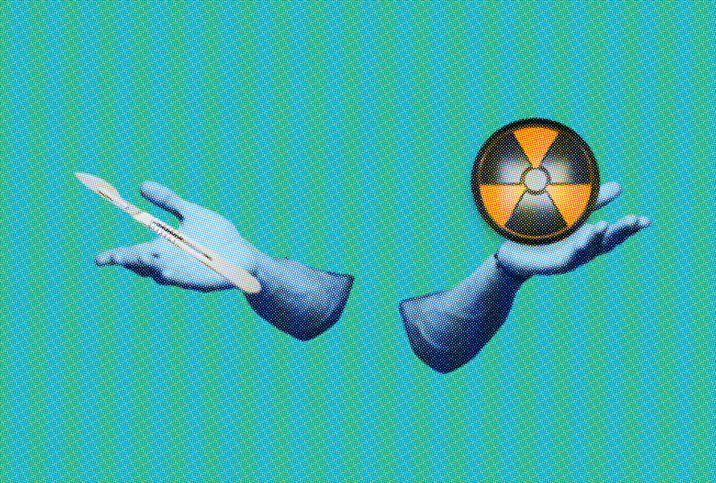Deciding Between Prostate Removal and Radiation

Around 13 percent of men in the United States will be diagnosed with prostate cancer in their lifetime. However, the prognosis can be more positive when the disease is detected early. Statistics show most men are diagnosed with prostate cancer while the disease is still in an early stage. In many cases, the cancer may not require immediate treatment. However, in cases where intervention is necessary, your doctor may recommend one of multiple treatment options.
Before making a final decision, it's important to consider all potential paths ahead and how each might affect your life moving forward.
Choosing between treatment and close monitoring
Depending on the stage of the disease, treatment for prostate cancer may not be necessary right away. Though some men opt to move forward with immediate treatment for peace of mind, others may choose close monitoring.
Older men or men in poor health might benefit from monitoring the disease rather than immediate treatment because of the possible exacerbation of existing health issues as a result of possible side effects. This is particularly true if the prostate cancer is low-grade and spreading slowly.
Pros and cons of radiation therapy vs. prostate removal
Prostate cancer is generally treated with either radiation therapy or surgery. Deciding between the two treatment options can be a stressful decision, as both carry side effects.
According to medical experts, radiation therapy and prostate removal surgery are known to affect sexual function, the bladder and the bowel. Radiation therapy is more likely to cause bowel problems, whereas surgery is more likely to cause incontinence and erectile dysfunction (ED), according to information published by the University of Michigan Health Library.
For some men, prostate removal may be the best way to relieve anxiety about cancer because it can provide a sense of comfort to think the disease has been fully extracted from the body. However, men who want to avoid sexual dysfunction may opt for radiation therapy instead.
Although advances in medical technology have made surgery a lot safer over the years, prostate removal is still a major operation. For people who aren't as concerned about sexual function but would rather avoid major surgery, radiation therapy might be a better option for prostate cancer treatment. This may be the case particularly for older men.
It's important to note while surgery is more likely to cause erection problems, radiation therapy has also been known to present sexual function issues.
The long-term outlook
Although prostate cancer is a common and sometimes fatal disease among men in the United States, there are reasons to stay positive in the face of a diagnosis. The relative five-year survival rate for men with prostate cancer detected in the early stages is nearly 100 percent, according to the American Cancer Society. For people diagnosed with the disease after the cancer has spread to other parts of the body, the relative five-year survival rate is 30 percent. Meanwhile, the 10-year relative survival rate for prostate cancer is about 98 percent.
It's completely normal to experience stress and anxiety when deciding if and how you want to treat your prostate cancer. Be sure to talk to your doctor about the potential risks and benefits of all of your options before moving forward.

















